

How to Follow Up After a Job Interview. Following up is an important part of the process after a face to face job interview.
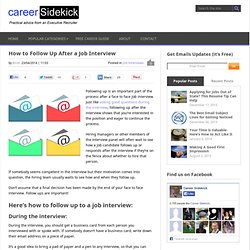
Just like asking good questions during the interview, following up after the interview shows that you’re interested in the position and eager to continue the process. Hiring managers or other members of the interview panel will often wait to see how a job candidate follows up or responds after the interview if they’re on the fence about whether to hire that person. One Simple Way To Make More Money In Your Career. There are many ways to make more money throughout your career, from taking on more responsibilities at work to getting a higher level of education.
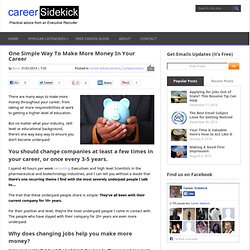
But no matter what your industry, skill level or educational background, there’s one way easy way to ensure you don’t become underpaid: You should change companies at least a few times in your career, or once every 3-5 years. I spend 40 hours per week recruiting Executives and high level Scientists in the pharmaceutical and biotechnology industries, and I can tell you without a doubt that there’s one recurring theme I find with the most severely underpaid people I talk to… The trait that these underpaid people share is simple: They’ve all been with their current company for 10+ years. For their position and level, they’re the most underpaid people I come in contact with. Why does changing jobs help you make more money? Companies realize that to get the best talent, they have to offer career-advancement.
Finding the Path of Least Resistance in Your Career. ― Mark Twain Have you ever had a day off from work and driven around mid-day, astonished at how little traffic there is?
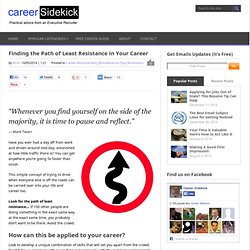
You can get anywhere you’re going 5x faster than usual. This simple concept of trying to drive when everyone else is off the roads can be carried over into your life and career too. Look for the path of least resistance… If 100 other people are doing something in the exact same way at the exact same time, you probably don’t want to be there. Avoid the crowd. How can this be applied to your career?
Look to develop a unique combination of skills that will set you apart from the crowd. If you work within a specific area of your company, think about what other skills would compliment that area, and you’ll have an advantage. One way technical people (engineers, computer programmers, scientists, etc.) do this is by learning to be business-savvy as well. Here are specific career examples to imitate in your life: Example 1: statisticians. Making More Money: Profit Centers vs Cost Centers.
Money is one of the top considerations when making career decisions throughout your life.
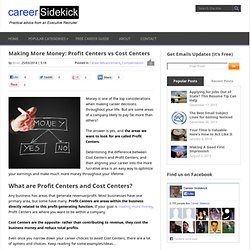
But are some areas of a company likely to pay far more than others? The answer is yes, and the areas we want to look for are called Profit Centers. Determining the difference between Cost Centers and Profit Centers, and then aligning your career into the more lucrative area is an easy way to optimize your earnings and make much more money throughout your lifetime. What are Profit Centers and Cost Centers? Any business has areas that generate revenue/profit. Cost Centers are the opposite- rather than contributing to revenue, they cost the business money and reduce total profits. What to Say When Asked for Salary Requirements. Knowing how to respond when asked about salary requirements for a new job is difficult.
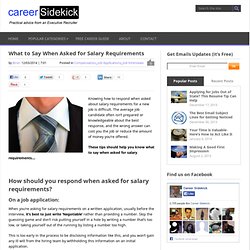
The average job candidate often isn’t prepared or knowledgeable about the best response, and the wrong answer can cost you the job or reduce the amount of money you’re offered. How to Follow Up After a Job Interview. 10 Questions to Ask on Any Interview. It’s important to ask questions on every interview you go on.
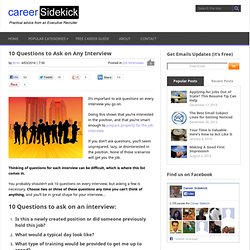
Doing this shows that you’re interested in the position, and that you’re smart enough to prepare properly for the job interview. If you don’t ask questions, you’ll seem unprepared, lazy, or disinterested in the position. None of those scenarios will get you the job. Thinking of questions for each interview can be difficult, which is where this list comes in. You probably shouldn’t ask 10 questions on every interview, but asking a few is necessary. Is this a newly created position or did someone previously hold this job? Not only will these questions make you seem smart and interested in the job, they’ll also allow you to gather valuable information that can help determine whether the job is a good fit for you or not. Remember- You should be evaluating and interviewing prospective employers at the same time they’re interviewing you. Freelancer Tips: You Can Get Paid Faster! Having a freelance job is not a mere game or a mere application of skills.
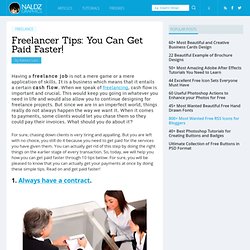
It is a business which means that it entails a certain cash flow. When we speak of freelancing, cash flow is important and crucial. This would keep you going in whatever you need in life and would also allow you to continue designing for freelance projects. But since we are in an imperfect world, things really do not always happen the way we want it.